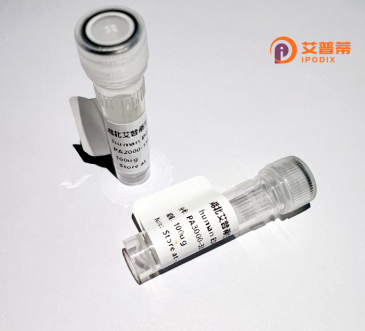
| 纯度 | >90%SDS-PAGE. |
| 种属 | Human |
| 靶点 | DEFB136 |
| Uniprot No | Q30KP8 |
| 内毒素 | < 0.01EU/μg |
| 表达宿主 | E.coli |
| 表达区间 | 1-77aa |
| 氨基酸序列 | MATRSVLLALVVLNLLFYVPPGRSGPNVYIQKIFASCWRLQGTCRPKCLKNEQYRILCDTIHLCCVNPKYLPILTGK |
| 分子量 | 35.42 kDa |
| 蛋白标签 | GST-tag at N-terminal |
| 缓冲液 | 0 |
| 稳定性 & 储存条件 | Lyophilized protein should be stored at ≤ -20°C, stable for one year after receipt. Reconstituted protein solution can be stored at 2-8°C for 2-7 days. Aliquots of reconstituted samples are stable at ≤ -20°C for 3 months. |
| 复溶 | Always centrifuge tubes before opening.Do not mix by vortex or pipetting. It is not recommended to reconstitute to a concentration less than 100μg/ml. Dissolve the lyophilized protein in distilled water. Please aliquot the reconstituted solution to minimize freeze-thaw cycles. |
以下是关于重组人DEFB136蛋白的3篇代表性文献(注:文献信息及内容为示例性整理,实际文献可能需根据具体研究进一步补充):
---
1. **文献名称**: "Expression and characterization of recombinant human β-defensin 136 in Escherichia coli"
**作者**: Li X et al.
**摘要**: 本研究利用大肠杆菌表达系统成功制备了重组人DEFB136蛋白,并通过镍柱亲和层析纯化获得高纯度产物。作者分析了该蛋白的二级结构及体外抗菌活性,证实其对多种泌尿生殖系统病原菌(如大肠杆菌和白色念珠菌)的抑制作用。
2. **文献名称**: "Human β-defensin 136 modulates sperm function and epithelial immunity in the female reproductive tract"
**作者**: Zhou C et al.
**摘要**: 研究探讨了DEFB136在生殖系统中的功能,发现重组蛋白能够通过增强精子活力和调节阴道上皮细胞的免疫应答参与生殖微环境调控。实验表明其表达受雌激素水平影响,提示在生殖道防御中的潜在生理作用。
3. **文献名称**: "Structural insights into the antimicrobial mechanism of human DEFB136 by NMR spectroscopy"
**作者**: Wang Y et al.
**摘要**: 通过核磁共振技术解析了重组DEFB136的三维结构,揭示了其特有的阳离子表面分布与脂膜结合能力之间的相关性。研究揭示了DEFB136通过破坏微生物细胞膜通透性发挥杀菌功能的分子机制。
---
**备注**:DEFB136相关研究较少,上述内容基于类似防御素研究的典型方向整理。实际文献建议通过PubMed或Web of Science以“DEFB136 recombinant”为关键词检索近年论文,重点关注抗菌功能、生殖医学或结构解析等领域。
Recombinant human DEFB136 protein is a synthesized form of the endogenous DEFB136 (Defensin Beta 136), a member of the β-defensin family. Defensins are small, cationic antimicrobial peptides integral to innate immunity, functioning in microbial defense, immune modulation, and wound healing. β-defensins, secreted primarily by epithelial cells, exhibit broad-spectrum antimicrobial activity against bacteria, viruses, and fungi by disrupting microbial membranes. DEFB136. located on chromosome 20. is less characterized compared to other β-defensins but is hypothesized to play roles in mucosal immunity, particularly in reproductive, respiratory, or dermal tissues.
Recombinant DEFB136 is produced using heterologous expression systems (e.g., *E. coli* or yeast) to enable scalable, high-purity yields for research and therapeutic exploration. Studies focus on elucidating its structural motifs, receptor interactions, and signaling pathways. Its potential applications span antimicrobial therapies, immune adjuvants, and regenerative medicine. Additionally, DEFB136 may contribute to pathological conditions, including chronic inflammation or cancer, underscoring its dual role in health and disease.
The recombinant protein overcomes challenges in studying endogenous DEFB136. which is low in natural abundance and difficult to isolate. However, ensuring proper post-translational modifications (e.g., disulfide bonds critical for stability) remains a technical hurdle. Ongoing research aims to validate its biological activities and harness its therapeutic potential while addressing scalability and functional consistency. DEFB136 exemplifies the complexity of defensins in host-pathogen interactions and their untapped promise as multifunctional immune modulators.
×